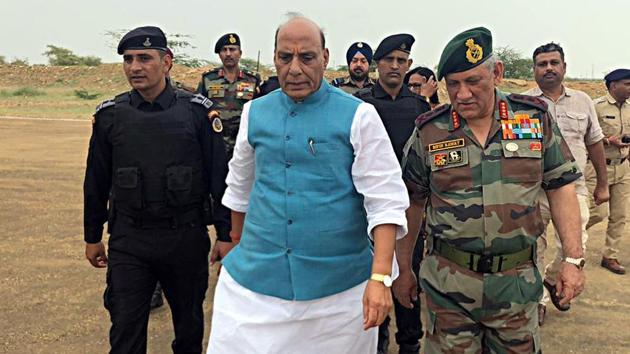
The recent cryptic remarks by Union defence minister, Rajnath Singh, on India’s traditional policy of no first use (NFU) of nuclear weapons, has predictably generated a debate. There are, however, compelling strategic and other reasons that would caution against the abandonment of this policy.

To be sure, Singh, while visiting Pokhran, stated that while today India stood by its NFU policy, “circumstances” would determine the future of New Delhi’s stand on the issue. But the subtext seemed to suggest that India could give up NFU as part of its new muscular foreign policy as well as the changed regional and international environment. Earlier in 2016, the then defence minister, Manohar Parrikar too questioned India’s decision to bind itself to the NFU principle.
It may seem tempting to discard the NFU tenet of India’s nuclear doctrine in a new, ambitious and confident Narendra Modi’s India, faced with an increasingly belligerent regional environment. This machismo, however, needs to be tempered by considering the raison d’etre of India’s NFU policy, in the first place.
Defined as an unconditional commitment to never be the first one to use or threaten to use nuclear weapons or initiate a nuclear strike against an adversary, the NFU principle was explicitly articulated in the draft nuclear doctrine of 1999. While caveats, not always explicit, may have been added since to this absolutist position (regarding non-State actors, nuclear weapons states or attacks by other weapons of mass destruction) the fundamental commitment to NFU, remains strong.
In 1999, India needed to assuage hostile international opinion in the wake of the nuclear tests of 1998. Facing international economic sanctions and more general opprobrium, the most prudent way forward was for India to reinforce its standing as a responsible nuclear power with the international community.
With a political commitment to NFU, India regained, more or less, its image as a strong, credible yet morally responsible State that found nuclear weapons an abhorrent tool of war, and acquired them for purely defensive purposes: To prevent nuclear threats and blackmail.
NFU was rooted in India’s historical past, with Gandhian principles of non-violence and the norms around the non-use of nuclear weapons. The norms against nuclear weapons can be traced back to the 1950s when Prime Minister Jawaharlal Nehru became the first head of State to call for a standstill agreement proposing a ban on nuclear testing in 1954. Additionally, in 1965, India ardently advocated a strong non-discriminatory treaty, banning nuclear proliferation. Hence, the normative strategic culture of nuclear minimalism and restraint manifested into and fell in line with the notion of ‘no first use’ and continues to guide Indian strategic culture around nuclear weapons.
But beyond history and morality, the strongest imperative for NFU is strategic. India’s nuclear doctrine is based on the assumption that a sufficient number of India’s nuclear forces will survive a first nuclear strike to be able to retaliate and cause unacceptable “massive destruction” on the adversary. An NFU posture allows for forces not to be on hair-trigger alert, and reduces the chances of a nuclear arms race as long as survivability of forces can be ensured through a combination of deception, redundancy and a sea-based deterrent. On the contrary, if a first strike posture was to be adopted by India, the threat of miscalculation increases manifold since a hair-trigger alert increases the risk of accidental launch of a nuclear-capable missile in response to a false warning. Such concerns are not purely theoretical as factors such as inefficient command and control system or sheer human error can very well lead to a situation of confusion and chaos triggering a nuclear strike.
NFU, minimises chances of a nuclear accident by allowing for a relatively relaxed posture and could prevent India from entering into a costly and potentially destabilising nuclear arms race, without undermining its nuclear deterrent.
For the longest time, NFU has been one of the key mantras of Indian nuclear thinking. Any change in the policy has the potential of creating uncertainty and risks in India’s neighbourhood, especially with China. Worse case: It could even provoke a preventive strike from India’s adversaries.
There is a strong reason why K Subrahmanyam, termed by many as the guru of contemporary Indian strategic thinking, had argued strongly for the NFU posture within the National Security Council Advisory Board as well as in his many public interventions. His strong support for the NFU policy was based on economic, social, political and international benefits that still carry merit.
It is important to remember that it was India’s image as responsible nuclear power forged through, inter alia, the principle of NFU and nuclear minimalism that reinforced India’s nuclear exceptionalism; a factor which disarmed nuclear non-proliferation absolutists when Manmohan Singh and George Bush negotiated the Indo-US nuclear deal. Ever since, India has received various waivers from the international community to further its civil nuclear programme for peaceful purposes. Additionally, India’s bid for NSG membership also relies on its image as a responsible nuclear power.
Abandoning its NFU policy at a time when the new international campaign for a ‘global NFU’ and a new ‘No First Use Act’ is gaining momentum, would only serve to undermine India’s standing without adding value to its force posture or its nuclear deterrent capabilities. It is important to continue to re-examine and re-evaluate India’s doctrinal posture with transparency to ensure that national security is not compromised. However, it is equally prudent not to impulsively abandon a long-standing tenet of India’s nuclear policy. Clearly, the time to abandon the NFU policy has not come yet. Instead, India should work for a global treaty on NFU that includes all the de jure and de facto nuclear weapon powers.
Shivani Singh is a research scholar, Disarmament Studies, JNU
The views expressed are personal